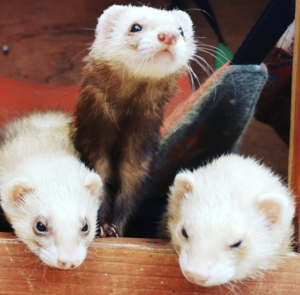
Alpha Feeds are proud to sponsor Becca and her beautiful, rescued ferrets. We know rehoming a pet is a huge decision and commitment for any pet owner. It also poses a minefield of questions – from how to integrate a fostered pet into your home, to being certain of their background, the shelter/person you are rehoming from and so on. With that in mind, we asked Becca to introduce herself and provide her useful tips on rescuing ferrets, after having such great success in doing it herself…. You can also follow Becca and her ferrets on Instagram.
Hi! I’m Becca, I’m an animal lover from Kent, and among my many animals, my first pets were a beautiful pair of ferret kits that I actually found while looking at Degus 10 years ago! They were looking for a “quick sale” as they were an albino and a runt, unfortunately the albino, Minx, didn’t live very long, she got sick and passed away at two years old during a surgery. The runt, Buffy, lived out her whole life as a much-loved pet until she passed away in her sleep in 2019 at nine years old. In those nine years, I’ve had many ferrets, ranging from little kits being thrown out, to an elderly blind girl who was unwanted, purely because she had aged.
Ever since I was little, I’ve had a huge passion for helping animals. I decided I was going to be a vet at four years old and I am still set on that goal, although a lot of other things in life seem to have pushed themselves first! For now though, I rescue animals myself where I can, and I’m a volunteer exotics handler at Second Chance Animal Rescue where I get to care for foxes, meerkats, racoons, civets and many other wonderful creatures that have found sanctuary after a tough life – sadly, the sanctuary currently has 50 ferrets in its care too.
I live with four fuzzy babies, Odin, Crumble, Pearl and Tink, although over the past 10 years I’ve had 12 ferrets, each and every one being rescued and mostly elderly.
Odin was discarded because he was “too gentle” to kill rabbits, Pearl was going to be let out in a field because she was a runt, Crumble was sent away because other ferrets bullied her and Tink was going to have her neck snapped because she wasn’t producing enough babies.
All of my ferrets have had a rough start to life and yet now live very happily in their forever home, with me. If this sounds like something you would like to do, here are my top tips to help you successfully rescue a ferret (or four)…..
Things to consider when rescuing a ferret:
- Personally, I’ve never had the chance to research where my ferrets came from as they’ve all been direct rescues, but I would definitely recommend researching any Rescues or breeders you’d be considering getting a ferret from. Social media, websites and visiting the shelter or home will give you a good feel for the rescue centre or person.
- For any new rescues I take on and plan to keep, they go through a 7-14 day quarantine just in case they become unwell, in this time I get vet checks done, flea and worm treatments done, and it also allows me to have a good amount of one-to-one contact and get to know the new member. Be prepared for unexpected costs. With ferrets, I’ve come to realise you should always be ready for vet bills- even more so if you have no idea about the ferret’s background. I’ve been caught dealing with tumours, blockages, internal damage from parasites, deafness and blindness, and the expected spaying and neutering costs. Some Rescues do offer help with any vet bills that arise in the first few months, but this is something that is dependent on where you go, and how the Rescue gets its funding.
- Definitely get insurance, it makes things so much easier if a sudden vet bill or other incident arises.
- After quarantine, take it slowly. Spend around a week with supervised playtimes and group feeding. If everybody gets along and I feel they are all safe and happy, I’ll put the new ferret in with the others.
Be Prepared
- Make sure you have a nice big enclosure- ferrets love to play and need a lot of space for their antics!
- Provide lots of nice bedding- ferrets sleep 14-18 hours a day so hammocks and cat caves are perfect for snoozing!
- Have the right food available- ferrets are carnivores and should only eat meat and/or a specialised kibble. Also make sure your food and water bowls are suitable, heavy ceramic or safely hooked bowls are perfect as these little guys love to tip things over!
- Research! There’s something new to learn every day about these amazing little creatures, so a lot of research is very important!
- Love them their whole life! Ferrets live 5-10 years, and they’re very smart and affectionate little creatures, and sometimes their way of showing it is a playful bite! They sometimes get depressed with being rehomed or adjusting to a new family, so please be prepared to love them their whole life!
Help to be prepared with Alpha Ferret Feast. Our carefully formulated, premium ferret food offers a complete diet to meet all the nutritional needs of working, pet and show ferrets of all ages and is the ideal way to feed your ferrets throughout all their life stages. Ferret Feast contains chicken & fish which are easily digestible sources of protein. It is easy to feed, removes the odour of more traditional feeding regimes and contains all the necessary vitamins and minerals that your ferrets need in order to remain in the very best of health. Visit our website to find out more.



